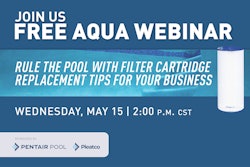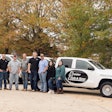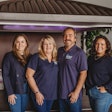Interest rates remain close to their historical lows but financing for many spa and pool businesses continues to be elusive. One problem: Lower interest rates mean lenders and investors can be more selective. How, then, can spa and pool business owners hope to fund the expansion of their operations?
Any quest for expansion funding must begin with an understanding of the various types of financing, where that funding is to be found, and at what cost. Generally, there are two basic ways to fund expansion: debt financing or equity financing.
With debt financing, capital is received in the form of a loan that must be paid back. With equity financing, capital is received in exchange for part ownership in the business.
EQUITY FINANCING
Equity financing can come from a variety of sources, including the spa and pool operation itself, the owner's pockets, as well as from private investors. Remember, however, keeping control of your business is more difficult when outside investors are involved.
Equity financing for growth or expansion is more straightforward than subordinated debt financing, as the investor need only be persuaded that the expansion will increase the equity value of the operation above the price the investor is paying for his equity today.
ANGELS
Getting expansion funding from venture capital firms is a long shot for most spa and pool businesses. There are a number of other sources, however, including so-called "angel" investors, that can be tapped for equity financing.
Originally, a term used to describe investors in Broadway shows, "angel" now refers to anyone who invests his or her money in an entrepreneurial company (unlike institutional venture capitalists who invest other people's money). Angel investing has soared in recent years as a growing number of individuals seek better returns on their money than they can get from traditional investment vehicles. Contrary to popular belief, however, most angels are not millionaires.
Angels might be found among service providers such as lawyers, insurance agents or accountants. Angels may also be business associates such as suppliers/vendors, customers, employees and even the competition.
ESOP IS NO FABLE
Selling stock in a spa and pool operation does not have to involve strangers. Selling company stock to the operation's employees through an Employee Stock Ownership Plan, or ESOP, is an often overlooked and usually misunderstood option.
With an ESOP, the incorporated business issues new shares of stock and sells them to an ESOP. The ESOP then borrows funds to buy the stock. The business can use the proceeds from the stock sale to its own benefit — say growth or expansion.
The company repays the loan by making tax-deductible contributions to the ESOP. The interest and principal on ESOP loans are tax-deductible, which can reduce the number of pretax dollars needed to repay the principal by as much as 34 percent, depending on the operation's tax bracket. Remember, however, the tax shield does not help with S corporations, they do not pay corporate income taxes. Capital gains deferral, however, can make ESOPs attractive to these pass-through business entities.
DO-IT-YOURSELF
A surprising number of businesses today have funds available after paying all of their bills — including taxes. One use for those unused profits is to distribute earnings to stockholders in the form of cash dividends. Seldom, however, are all earnings paid out as dividends. Usually a portion is kept to finance future growth. Unfortunately, more commonly, retained earnings are often largely wishful thinking. In fact, expanding with internally generated funds can be a very difficult process to plan for and implement. The main consideration, obviously, is whether the business has sufficient internal cash cows to pay for expansion outlays.
Often growth requires additional working capital to finance inventory purchases and accounts receivable that may grow faster than payables, putting the spa and pool business in a tight cash position. If this growth follows historic patterns, and is built on business relationships roughly similar (at least as to creditworthiness) to the operation's current base, a revolving line of credit can generally be expanded to accommodate the new credit needs of the business.
LOANS FOR YOUR DREAM
Raising expansion funds by borrowing allows the spa and pool business to benefit from the principal of leverage — a technique of increasing the ratio on investment through the use of borrowed funds. As long as earnings exceed interest payments on borrowed funds, the application of leverage allows the business to increase the rate of return on stockholders investments. But leverage also works in reverse.
BORROWING FOR EXPANSION
In addition to those loans that a business often receives from its owner, there are a variety of other types of funding available from a number of lending sources. A bank is probably the best-known source of funds for most spa and pool businesses.
Typically, banks are the place to go for short-term lending, usually secured by tangible assets. In other situations, however, banks often help in either of two basic ways. First, commercial banks can help a business increase production or output by providing funds to secure new equipment, machinery, vehicles and other instruments and devices.
The second area where banks can help is with working capital lines of credit to help the business expand its cash-.ow volume.
UNCLE'S HELPING HAND
Often thought of as a lender of last resort, the U.S. government is actually an excellent source for a wide variety of economical financing. After all, the federal government has a vested interest in encouraging the growth of small businesses. As a result, some loans, particularly those of the Small Business Administration, have less-stringent requirements for owner's equity and collateral. In addition, many SBA loans are for smaller sums than most banks are willing to lend.
7(A) LOANS
The biggest and most popular SBA loan program is the 7(a) Loan Guarantee Program. The SBA guarantees up to $750,000 or 75 percent of the total amount, whichever is less. For loans of less than $100,000, the guarantee usually tops out at 80 percent of the total loan.
A 7(a) loan can be used for many business purposes, including real estate, equipment, working capital or inventory. The loans can be paid back over as long as 25 years for real estate and 10 years for equipment and working capital. Interest rates are a maximum of 2.25 percent over the prime rate when the loan term is less than seven years and 2.75 percent if more than seven years.
The 7(a) program also offers several specialized loans including the LowDoc Program for fast processing for amounts under $100,000. The "Low Documentation" program relies heavily on your personal credit rating and the business's cash cow.
504 LOAN PROGRAM
At the top end of the SBA loan size spectrum is the 504 Loan Program, which provides long-term, fixed-rate loans for financing fixed assets, usually real estate and equipment. These loans are usually made through Certified Development Companies (CDCs) — nonprofit intermediaries that work with the SBA, banks and businesses looking for financing.
Those spa and pool businesses seeking funds of up to $750,000 to buy or renovate a building or buy some major equipment, bring the operation's business plan and financial statements to a CDC. Typical percentages for this type of package are 50 percent financed by the bank, 40 percent by the CDC and 10 percent by the business or its owner.
In exchange for this below-market, fixed-rate financing, the SBA expects the business to create or retain jobs or to meet certain public policy goals such as an Enterprise/Empowerment Zone, a minority-owned business, etc.
LOCAL FUNDING
Some of the best sources of assistance are the many state, regional and local economic development agencies. There are nearly 12,000 economic development groups in the United States. The purpose of these groups is to provide economic growth and development in the areas they serve. They generally encourage new or expanding businesses to locate in their area or to remain in the area.
Even those who are aware of public funding often have misconceptions about who will and will not qualify. Many of these programs are looking for businesses with proven track records. The state, regional and local agencies are willing to help them expand their sales, which in turn will help expand the tax base as well as increase employment.
While not always a source of expansion financing, a state's office or agency of economic development can be a guide to regional and local funding.
Obviously, financing the growth of the spa and pool business is a complex affair. Funding to help grow and expand is, however, widely available to those spa and pool professionals willing to do their homework. Comparison-shopping for lenders, rates and terms is strongly recommended.







































